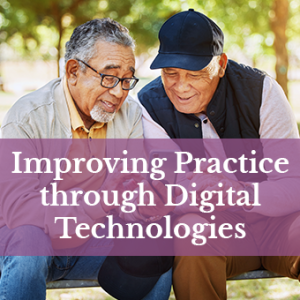
Understanding the Ethical and Other Implications of Leveraging AI and Other Digital Technologies to Enable Healthy Ageing and Ageing-in-the-Right-Place

Presenter(s):
Samir Sinha; Caroline Emmer De Albuquerque Green; Kristina Kokorelias, National Institute on Ageing, Canada
Abstract
By 2030, 34 countries will be considered ‘super-aged’ – where more than 20% of their populations are 65 years and older, compared to only 3 in 2014. All of these and other rapidly ageing nations are grappling with how their strained health and social care systems and societies in general can continue to best meet their evolving population’s needs.
Effectively addressing these long-anticipated demographic challenges, however, has remained elusive. They require more responsive systems and services that can better enable both healthy ageing and ‘ageing-in-the-right-place’, or in other words, allowing more people to appropriately age well in their own homes and/or communities for as long as possible. Not only is this what nearly 100% of older people say they desire, but it’s also a highly appealing strategy for policy makers. Indeed, enabling more people to live healthier and active lives and receive care in their own homes is not only far less expensive but also safer than doing so in care homes. To encourage leadership in these areas, 2021-2030 has been declared the UN Decade of Healthy Ageing.
Technological advances over recent decades, such as smart home, wearable, remote monitoring and other applications, has raised significant hope – recently catalyzed by the pandemic – that they can better enable both healthy ageing and ageing in the right place. However, their rise is also being met with new significant logistical and ethical challenges that could limit their potential societal acceptance and adoption.
Additionally, despite the growing use of technologies, no known jurisdiction has created comprehensive policy or evaluation frameworks to enable the creation and widespread adoption of promising technologies to enable both healthy ageing and ageing in the right place. Nevertheless, there exists widespread interest for the creation of evidence-informed guidance that could better enable technology developers, policy and decision-makers, care providers and, most importantly, future care recipients and their families.
We are proposing to host a workshop to share existing knowledge that highlights challenges older adults face, summarize the latest existing literature on the topic, and showcase examples of work being done to address the following three broad questions:
1. What is the state of the evidence on the current challenges, opportunities and outcomes related to technology and AI solutions that address healthy ageing and ageing-in-the-right-place?
2. What are the key ethical considerations that have arisen with the use of age-tech solutions including the development of virtual, remote care and AI solutions or are being anticipated and how best to address them?
3. What should an evidence-informed policy, implementation and evaluation framework be comprised of that both developers and jurisdictions can use to anticipate and address potential implementation considerations? And what can we do to better enable the widespread implementation of promising and appropriate digital technologies and AI solutions?
Our target audience for this workshop are all IFA conference attendees and will also encourage a robust dialogue to highlight ways policy and decision-makers, health professionals across disciplines and others can better support and advocate for the responsible use of digital technologies, including AI, to enable healthy ageing and ageing in the right place.
Bio(s):
Dr. Samir Sinha is a Geriatrician and Clinician Scientist at Sinai Health System and the University Health Network in Toronto, a Professor of Medicine at the University of Toronto, the Director of Health Policy Research at Toronto Metropolitan University’s National Institute on Ageing, and a Professor of Medicine at the University of Toronto, and a Fellow of the Canadian Academy of Health Sciences and the Royal Society of Medicine.
A Rhodes Scholar, Samir is a highly regarded clinician and international expert in the care of older adults. As a member of the Government of Canada’s National Seniors Council he recently led the successful development of Canada’s new National Long-Term Care Services Standard. Samir recently served as a 2024-2025 Visiting Fellow at the University of Oxford and AMS Fellow in Compassion and AI exploring the ethical and other implications of leveraging AI and other digital technologies to enable healthy ageing and ageing-in-the-right-place.
Internationally, since 2014, he has served as a member of the American Red Cross Scientific Advisory Council and was recently appointed to serve on the Board of Trustees for HelpAge International.
—
Dr Caroline Green is Director of Research and Head of Public Engagement at the University of Oxford’s Institute for Ethics in AI. Caroline’s research focuses on AI and human rights, specifically in the fields of health and social care. Caroline holds a LLB (Hons) from the University of Edinburgh, an MSc in Human Rights from the LSE, a MA in Investigative Journalism from City University and a PhD in Gerontology from King’s College London. As Director of Research, Caroline also leads the Accelerator Fellowship Programme at the Institute for Ethics in AI.
—
Dr. Kristina Kokorelias works as the Senior Program Manager for the Department of Medicine’s Healthy Ageing and Geriatrics Program at Sinai Health and the University Health Network in Toronto. Kristina also has status appointments as Associate Scientist (Sinai Health) and Assistant Professor, Occupational Science and Occupational Therapy at the University of Toronto and also serves as an Associate Fellow with the National Institute on Ageing. Her program of research aims to understand the experiences and needs of family caregivers and older adults with complex care needs with the aim of using this information to develop, evaluate, and implement timely family-centered care programs and services. Kristina received her PhD from the Rehabilitation Sciences Institute at the University of Toronto and completed post-doctoral fellowships in Implementation Science and Alzheimer’s Diseases with St. John’s Rehab within the Sunnybrook Health Sciences Centre.
